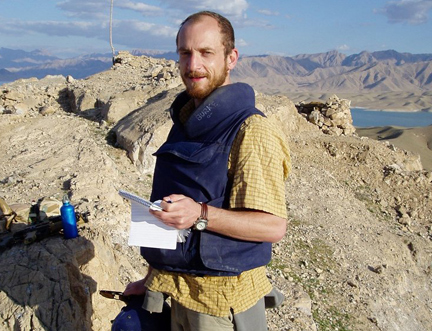More articles Sunday 23 August 2015 1:30pm
Jason Burke tells the Book Festival that the West has misunderstood Islamic radicalism

The British muslim teenage girls who travelled to Syria to join Islamic terrorists were looking for a “pure Islamic lifestyle”, not to commit acts of violence, the author and journalist Jason Burke told his Book Festival audience yesterday.
The author of The New Threat, which sets out the latest phase of Islamic militancy, said that the West has misunderstood radicalisation as being a single event, rather than a series of steps leading them into a community that draws them to it. “We are trying to comfort ourselves by saying ‘okay, this guy was radicalised, that means he was brainwashed or there was some epic event that suddenly radicalised him, or that he ‘self-radicalised’, which seems a strange thing to me, because terrorism is a profoundly social activity,” he said. “It’s about people, it’s about peer groups, it’s about how people develop a particular view of the world.”
In the case of the high-profile story of a number of British muslim teenage girls who travelled to Syria with the aim of marrying Islamic State fighters (IS), he said that having been in contact with them, he felt it was a project based more on identity than violence. “They were going off to join Islamic State, the Caliphate and live what they see as a pure Islamic lifestyle, and when I’ve spoken to them, you can see that their motivation is not usually violent in the same way. They’re not wanting to blow things up in the same way. Many of them would not support violence in the UK, though they support violence elsewhere. So I think their project is one that is much more based on identity, based on a cause, and what they see, wrongly, as a righteous fight.”
Jason said that the West had also misinterpreted the Arab Spring because it had mistaken the vocal middle class commentators as the driving force of the movement, rather than a working class that was “deeply conservative” with a “strong faith identity and particular vision of the world”. The journalist added that he had not foreseen how the revolution had opened opportunities for smaller terror groups that would transform the situation.
Jason, who has reported on the emergence of Islamic militancy for more than a decade, said that the picture was now fragmented and constantly evolving. The existing structure, he explained, had Al-Qaeda and IS forming a central core; smaller groups, such as Boko Haram, loosely affiliated to the larger ones; the ‘Movement’, a larger network consisting of supporters, smaller networks and ‘lone wolves’ - individuals who through the support of the network commit acts of terrorism.
The writer said, however, there were fundamental differences in strategy, particularly when it comes to the brutality that IS has become known for. “There is a necessary escalation in what they are doing, which is driving them to commit ever-greater atrocities, to the point that Al Qaeda are strongly critical of the Islamic State’s methods because they believe it’s counterproductive [to their cause],” he said.
Jason also highlighted how the terror groups were at the cutting edge of digital technology when it came to broadcasting propaganda. “The thing they have got to now, and militants in France have been using, are these little Gopro cameras, which are for extreme sportsmen,” he said. “You can stick it on your helmet or whatever, and it will record a point-of-view image, or, if you set it up properly, it will feed [to the internet]. So basically means that [a terrorist] is not far away from being able to broadcast directly, from his point of view, a live terrorist attack. The question that is going to pose is ‘are we going to watch?’.”

 Major new partnership with Celtic Connections
Major new partnership with Celtic Connections 

